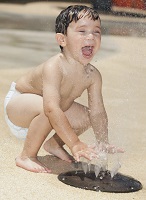No Germs Allowed: Tennessee FoodCORE Team Aims to Keep Splash Pads Safe and Fun

A splash pad is a recreation area for water play that has little or no standing water. Splash pads are often located in public parks. (Also known as: interactive fountain, wet deck, water play area, spray pad, or spray park.)
An afternoon playing in the water can be a great way to beat the summer heat. But sometimes there’s something more than water coming through the jets at splash pads and other water play areas, such as germs that can cause vomiting and diarrhea.
In July 2014, the Tennessee Department of Health linked an outbreak of Salmonella to a splash pad in west Tennessee. Following this outbreak, the Department of Health and its FoodCORE Interview Team investigated splash pads to identify the hazards and to prevent similar outbreaks. The FoodCORE team included laboratorians, epidemiologists, environmental health specialists, and a group of public health student interviewers. The team evaluated the water quality at 29 of the 59 splash pads identified across the state. They found:
- Over 20% of the water samples tested did not have the recommended level of chlorine
- Nearly one in five (17%) water samples tested had germs that could make people sick, including Escherichia coli, Giardia, norovirus, and Salmonella
At 17 of the 59 splash pads, the team also looked for behaviors that could make people playing at a splash pad sick. They found:
- People got water in their mouths or sat on a fountain or spray head an average of 22 times per hour
- Twenty (21%) of 95 patrons were children in diapers and 4 (20%) had a diaper changed in the splash pad area
The entire FoodCORE team was instrumental in this investigation and research: the astute laboratorians who identified the Salmonella outbreak, the student team and epidemiologists who interviewed the cases and found the link to the splash pad, and the environmental health specialists who conducted the water quality assessments.
Through this investigation, the Tennessee FoodCORE team learned that the state does not regulate splash pads, unlike public swimming pools. The team also learned that the water at splash pads is often recirculated and may not be adequately treated to kill germs. This investigation led the Tennessee Department of Health to propose adding splash pads to the current swimming pool regulations to prevent future illnesses. Guidance will be available to community recreation directors to help them make splash pads safer for people to enjoy.
Learn more about Water Play Areas & Interactive Fountains
Acknowledgement: The Tennessee Department of Health would like to thank CDC-RFA-EH10- 100105CONT14 Revitalizing Core Environmental Health Programs through the Environmental Health Specialists Network (EHS-Net): Delivering Environmental Health Services, NCEH for funding the Statewide Splash Pad Survey.